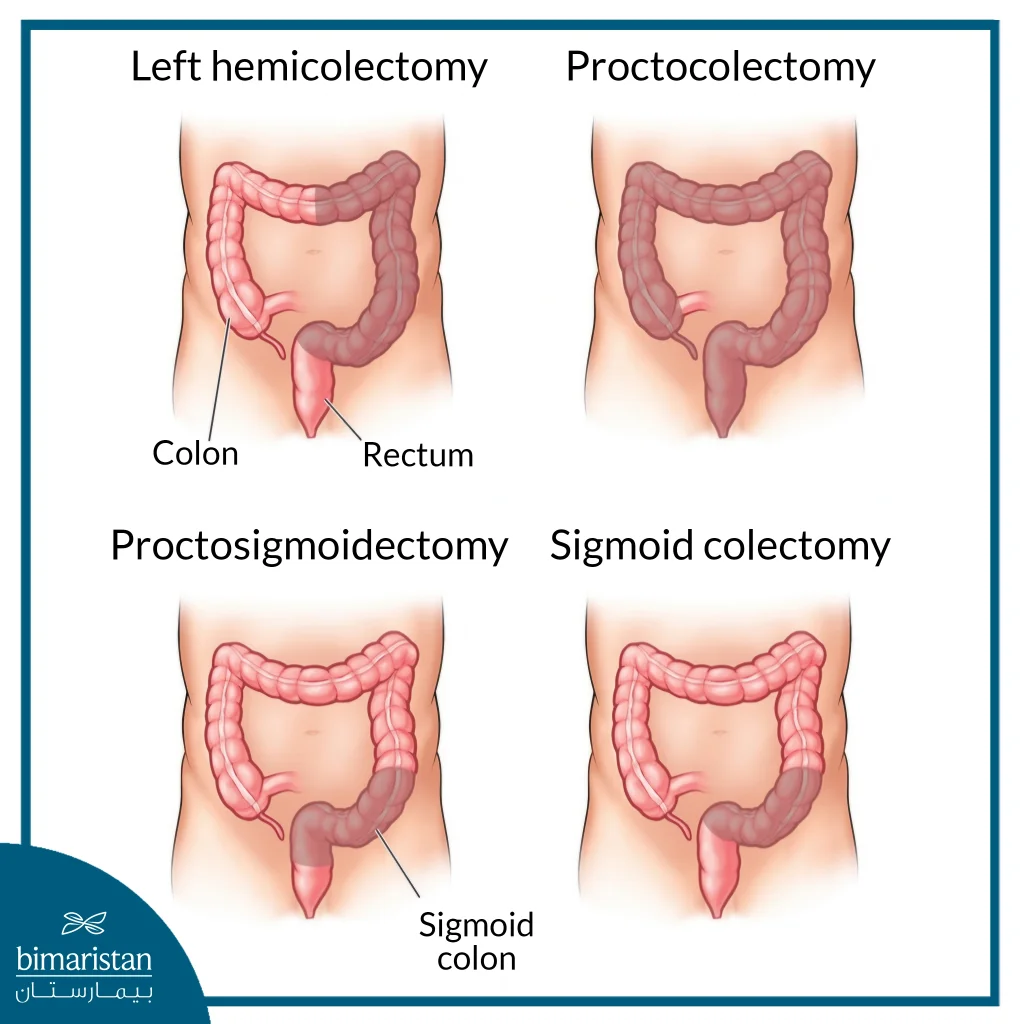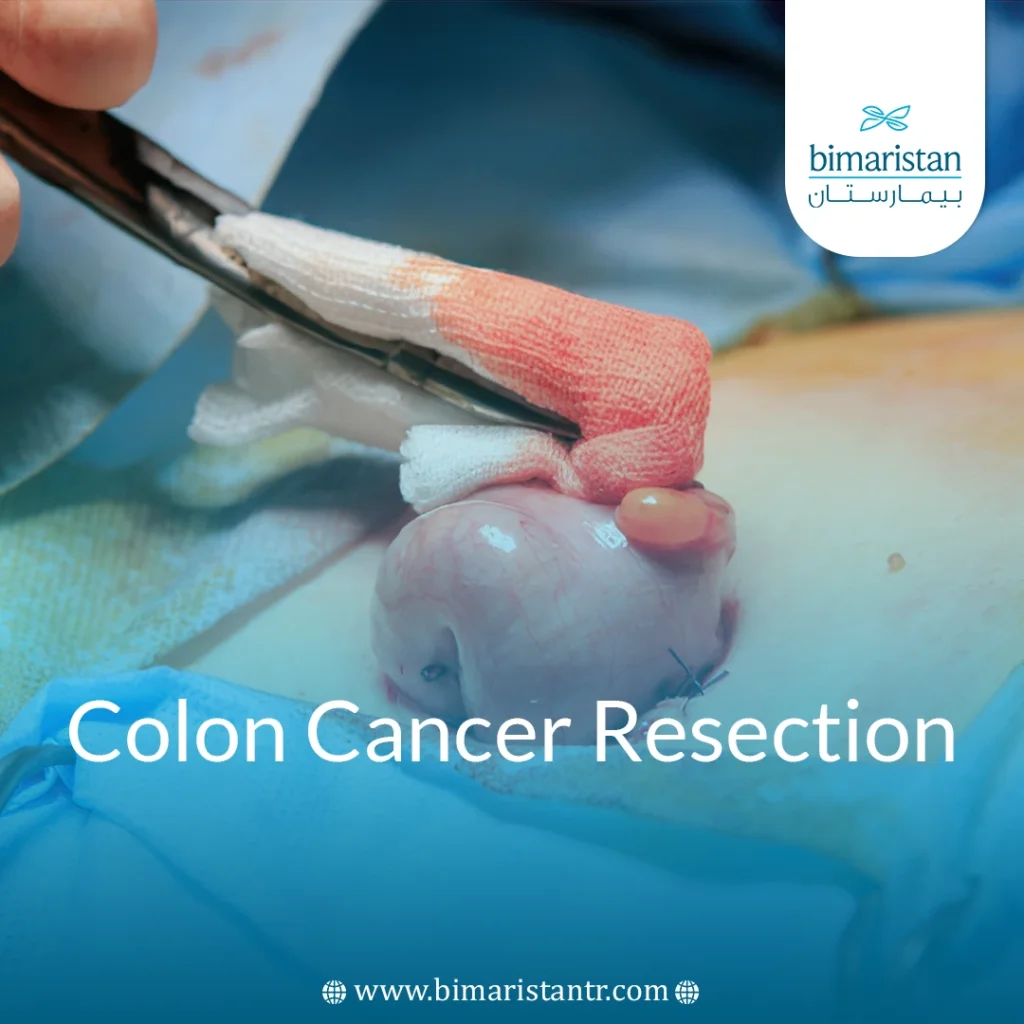Colon cancer is one of the most common cancers in the body and is a leading cause of cancer-related deaths. Therefore, early diagnosis plays a vital role in improving the chances of treatment and survival, which is why medical awareness and regular screening are essential. Colon cancer has different treatments, but colon cancer resection is one of the main treatment options that helps remove the tumor and control the disease, especially in the early stages. Therefore, surgery plays a crucial role in treatment and obtaining the best outcome for the patient.
What is colon cancer?
Colon cancer is a disease that usually arises through the abnormal growth of cells within the colon wall in an uncontrolled manner, which leads to the formation of small tumors or polyps that are benign. But over time, these tumors can turn into malignant tumors that can then spread inside and outside the colon.
The difference between benign and malignant tumors lies in their ability to invade and spread in the body, as benign tumors do not spread, while malignant tumors spread and, in advanced cases, invade neighboring organs. Colon cancer has different stages, starting from stage 0, the beginning of the tumor, which is limited to the lining of the colon, up to stage 4, when the cancer invades other organs and is then called metastatic cancer.

Aging, a family history of the disease, smoking, obesity, and an unhealthy diet are all factors that increase the risk of colon cancer.
When is surgery necessary for colon cancer resection?
Surgery for colon cancer resection is required in the following cases:
- The presence of a malignant tumor was confirmed by biopsy.
- Failure of non-surgical treatment (such as chemotherapy or radiation).
- Intestinal obstruction or uncontrolled bleeding.
- Stages of cancer in which complete recovery is possible after surgery.
Types of colon cancer resection surgery
The main treatment is often the surgical removal of colon cancer, as several types of surgical treatments depend on the type of surgery suitable for you, the location and stage of the cancer, the purpose of the surgical intervention, taking into account your health condition, so the types of surgery commonly used to remove colon cancer include the following:
- Polypectomy: Aimed at removing polyps in the colon before they turn into cancer or used to treat cancer in the early stages, stopping the cancer completely before it spreads. This procedure is performed during a colonoscopy.
- Colon resection includes two types
- Partial colectomy: This procedure aims to remove the cancerous portion of the colon, some healthy portions on either side of the cancerous portion, and associated lymph nodes, such as the sigmoid colon or part of it.
- Total colectomy: This procedure aims to remove the entire colon while leaving the rectum intact. It is used when colon cancer is accompanied by another condition, such as inflammatory bowel disease or Lynch syndrome.
- Colon obstruction surgery is performed when there is a blockage due to cancer, and may include removal of the blockage or a temporary ostomy.
- Bypass surgery: Bypassing the blocked section by connecting the healthy intestine to avoid the tumor without surgically removing it. Used to relieve symptoms.
- Stenting: Placing a metal tube through a colonoscope to keep the bowel open, as a temporary or permanent solution.
Surgery to remove colon cancer is performed using two main methods:
- Laparoscopic surgery
- Precision instruments are used through small incisions.
- Recovery time is faster, and pain is less severe.
- Fewer complications.
- Not suitable for all cases.
- Open Surgery
- The doctor makes a long abdominal incision.
- Requires longer recovery time.
- Higher risk of complications.
- Used in complex or advanced cases.
Colon cancer resection surgeries also vary depending on the case, and include emergency and planned surgeries. The following table shows the difference between them in terms of reasons, timing, and advantages.
| Criterion | Emergency surgery | Planned surgery |
|---|---|---|
| Reason | Intestinal obstruction, bleeding, or sudden intestinal perforation | Confirmed and early diagnosis with advanced planning |
| Timing | Immediate intervention occurs without much preparation | Performed after patient preparation |
| Advantages | Rapid response to a serious emergency | Choosing the best type of surgery and minimizing complications |
| When to choose? | For sudden medical emergencies | When there is time to plan and prepare |
How to prepare for a colon cancer resection?
Preparing for colon cancer resection surgery involves several important steps:
- General condition assessment: This includes blood tests, colonoscopy, computed tomography (CT) scans, as well as examination of the heart and lungs.
- Stop taking certain medications: Some medications may increase the risk of complications during surgery, such as blood thinners, so your doctor will ask you to stop taking them before the procedure.
- Empty the colon before surgery: The intestines are prepared by drinking a laxative solution mixed with water according to the doctor’s instructions, which causes diarrhea to empty the colon, and enemas may be recommended in some cases.
- Fasting before surgery: The patient should stop eating and drinking as instructed by the doctor for several hours or up to a day before the procedure.
- Taking antibiotics: Your doctor may prescribe antibiotics to control the normal bacteria in your colon and prevent infection.
- Pre-operative instructions and expectations: This includes knowing how long to fast, the type of anesthesia used, and other special instructions.
Surgical procedure
On the day of surgery, the following takes place:
- Move the patient to the preparation room and monitor blood pressure and respiratory rate.
- The patient is transferred to the operating room and is given general anesthesia.
- It can be performed in one of the two ways we talked about above
- Open colectomy
- Laparoscopic colectomy
While the type of operation a patient undergoes depends on the patient’s condition and the surgeon’s experience, laparoscopic colectomy minimizes pain and recovery time after surgery, but it is still not suitable for all patients. In other cases, laparoscopic surgery can turn into open surgery, depending on the circumstances of the medical team and the patient’s health status.
Once completed, the surgeon will reconnect the digestive system so that the body can get rid of excess waste, which can be done in a number of ways:
- Reattaching the remaining parts by sewing them together or to the small intestine, this is called an anastomosis.
- Connecting the intestines to an opening created in the abdomen, allowing waste to exit the body through the opening, and this method can be permanent or temporary.
- In some cases, the small intestine is connected to the anus after removal of the colon and rectum, where the surgeon attaches a pocket to the anus for natural waste elimination. This is called an ileoanal anastomosis.
Post-surgery and recovery period
After surgery, the patient is transferred to a recovery room until the anesthesia wears off, and then the medical team transfers the patient to a hospital room to continue recovery. The length of stay in the hospital usually takes from days to a week, depending on how long the bowel function is restored.
The patient must adhere to a specific diet, as solid foods cannot be consumed at first, and the patient often receives food through an intravenous infusion of food in liquid form, then gradually start drinking clear liquids and gradually move to eating solid foods when the intestines recover, if there is a colostomy or ileostomy to connect the intestines to the outside of the abdomen, a nurse will be sent to explain how to care for the stoma and how to change the stoma bag that will collect waste.
The patient should follow up regularly with the doctor to assess healing, monitor wound healing, monitor bowel function and improvement, and detect any complications that may occur.
It should be explained to the patient that the period of return to daily life and full recovery often ranges from 4 weeks to 6 weeks, depending on the speed of recovery and the nature of the activity.
Possible complications of colon cancer resection
- Bleeding or infection after surgery.
- Leaky intestinal junctions.
- Intestinal obstruction after surgery.
- Formation of blood clots in the legs (deep vein thrombosis) and lungs (pulmonary embolism).
- The sutures that connect the rest of the digestive tract are disintegrating.
- Long-term effects include a change in output pattern.
In conclusion, colon cancer resection is one of the effective and important surgeries in controlling and managing the disease, so it is necessary to choose a specialized medical center that has a highly experienced surgical team and previous experience in colon cancer resection operations to ensure the best results. Periodic follow-up plays a prominent role in the early detection of any possible complications or relapses, and through the remarkable medical development in science, recovery rates and quality of life after resection have increased significantly.
Sources:
- MedlinePlus. (n.d.). Colectomy. Retrieved June 29, 2025, from
- Liu, H., Zhu, F., Luo, Q., & et al. (2021). Outpatient colectomy: Feasibility and safety. PubMed. Retrieved June 29, 2025, from

